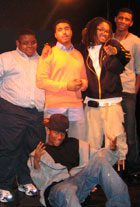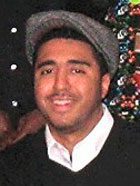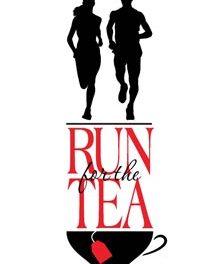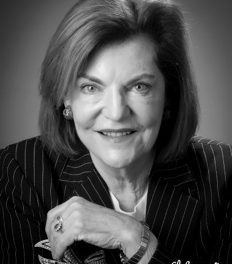Ambient light from the stage lit the sparsely populated room. My daughter, home from the College of Charleston for a weekend, and I found seats at a little round table.

On the red and white vinyl tablecloth sat a candle in a squat red jar, 4 place settings with plastic forks, Styrofoam cups and paper napkins.
Young men seemed to be loitering around. They stood in the lobby where we bought our $5 tickets, they moved in and out of the door behind the stage area, where there was activity of some kind going on, and a couple came by our table. My daughter had graduated from high school with them and they chatted for a while before moving off.
Slowly the room began to fill. There were several more young men in their late teens and early twenties. A woman I knew as a poet and performing artist came in with and her brother who was carrying a guitar case. At a large table near the stage a classmate of my husband’s sat with her family, including her first grandchild. There was a stir as a group of 8 to 10 — a little more urban, a little more sophisticated — came in and claimed another large table. The crowd beginning to fill the small room at the Sea Island Conference Center on Ladies Island was becoming multi-generational.
A boy I had known as an awkward kid came to our table and in his lowest voice asked if we wanted any coffee. Soon a beautiful freckled woman with full hips and lips, an explosion of auburn hued curls and a light in her eyes, swung by our table with a platter of pancakes. “We have plenty!” she said with a laugh in her voice. Coffee. Pancakes. And soon, once the big guy with the ZZ Top beard settled behind the soundboard, poetry.
He came from the back of the crowd, a diminutive man, with a huge smile on his face, his arms spread in greeting and his voice resonant with charm. “Welcome!” he called, “Welcome to my country. Welcome to my America.” And as he made his way to the stage we begin to realize that this wasn’t the introduction to the event, it was the event. As he spoke, he began to expand until he filled the stage, the room, the very building. His poem was the vehicle of transformation. It was a love poem. It was a heartbreak poem. It was a poem of longing and conflict. Suddenly it wasn’t just a Friday night in a small hall on South Carolina’s coast. It was a salon in Harlem and Langston Hughes was crying, “I, Too, Sing America.” It was a house party in Brooklyn and James Baldwin was leaning on a kitchen counter a cigarette in his lips, reading an excerpt from “Go Tell It on the Mountain.” And I was no longer a curious middle-aged mother with a cooling cup of coffee. I was a part of the community that is America, undefined by age, race or culture. Meet Jamie Fleming. And welcome to Poetry and Pancakes. 
Poetry and Pancakes is the creation of Jamie Fleming and Mackenzie McGrew. “I was always that guy” Jamie told me. “Even during my four years in the Air Force I was a writer, not a fighter.” He laughed. His voice, when not on stage, is low key. He is very respectful. He calls me ma’am. Despite the gentleness of Jamie’s voice and the careful control of his expression, his large black eyes are sharp and his body vibrates with intensity. This man is not laid back. Following his stint in the service, he went to Rutgers University where he studied Political Science. Mackenzie was there doing graduate work in Public Administration. They did the obligatory “just friends” thing but soon allowed it to be what it was and came together in a mutual desire for community development, powerful language, and each other. The first poetry and pancakes was in their New Jersey student apartment.
“We’d invited people to come over and read their poetry and hang out. We were poor, so all we could afford that would fill people up was pancakes! Soon it was a regular event.” Mackenzie, of the auburn curls and vibrant beauty, is the pancake cook. Community development is her passion and she is the embodiment of “Think globally, act locally.” She’s traveled worldwide, spending four years studying and working in the Middle East before returning to Newark to work with the Phenomenal Women Outreach Center. Together they would change the world.
And then, Jamie came home. He’s a Beaufort boy, born and bred, a graduate of Battery Creek High School’s class of 1999. A classic over-achiever, Jamie was captain of his debate team, member of the theater club, and student body president. He spent his junior and senior summers at the Governor’s School for the Arts in Greenville, SC. He was the accompanist for the choir at St. Paul’s Baptist Church and the apple of his parent’s eye. A shining star. And then it fell apart. The details don’t matter as much as the result. Suffice to say that in an act of disillusionment, he found himself in a fight, which resulted in an arrest. His parent’s, wanting him to understand the gravity of his actions, left him in jail. And it was there, scared and feeling very small, that he wrote his first poem. “I wrote it in my head,” he said, “I didn’t have anything to write it down with. I memorized it. And when I got out I was so remorseful, so sorry for letting down all the people who believed in me, that I asked the Elders at the church to let me speak. And I stood up and spoke that poem.”
Jamie doesn’t recite poetry. He “spits” it. This is a crucial distinction. Spoken word artists don’t just read, they speak their poems with passion. An element of showmanship is involved. As the popularity of Spoken Word spreads, competitions have sprung up across the country with poets speaking sans notes with just a microphone. They are sharing their souls, “spitting” their “ish.” (Yeah, I didn’t know what that was either, but it’s a kind of hip-hop speak for “issues.”) These are poems about something. What that something is is your choice, but social and political issues are common.
That evening at the Sea Island Conference Center featured Spoken Word Artist Lashanta Ase, who spat smooth and cool to the music of her brother’s acoustic guitar. Skooby, a rising star, rapped the single from his new CD. Another young man stepped out of his daddy’s shadow to sing his own a cappella song. A woman with long brown legs that rivaled Tina Turner’s improv-ed a piece with a jazzy feel. And several others read the poems and stories they’d been scribbling in notebooks and hiding in the back of drawers. We were a mixed bunch with varying skills, but all — the spoken word “virgins” and the veterans — felt safe to speak.
“So why are you here?” I asked Mackenzie and Jamie. “What is it you want to happen?” Mackenzie said, “We both believe in community outreach. That’s what we want to do.” Mackenzie serves as Director of Community Outreach at the Technical College of the Lowcountry, but her vision is more global than that. “We’re here to create community.”
I thought of the teenagers and old heads, the sophisticates and neophytes, the hip-hoppers and crooners who had gathered for the 1st Poetry and Pancakes event. They are off to a good start.
Poetry and Pancakes will soon celebrate its first anniversary in the Lowcountry. For more about Poetry and Pancakes, visit www.myspace.com/soundtracktolife for scheduled events and other productions of Jamie Fleming and Mackenzie McGrew.







